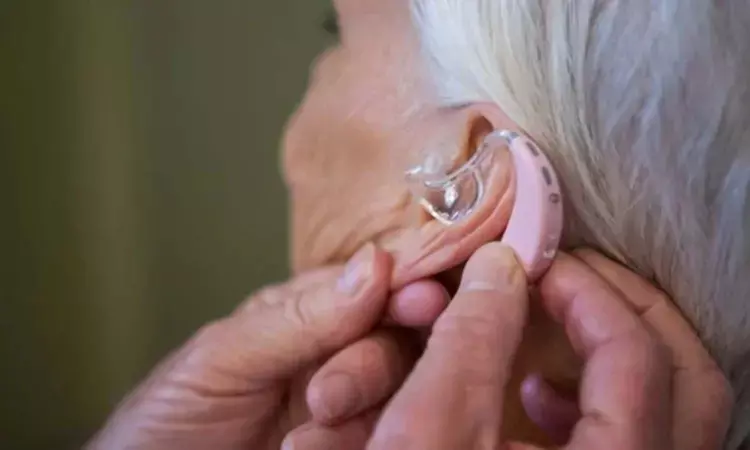- Home
- Medical news & Guidelines
- Anesthesiology
- Cardiology and CTVS
- Critical Care
- Dentistry
- Dermatology
- Diabetes and Endocrinology
- ENT
- Gastroenterology
- Medicine
- Nephrology
- Neurology
- Obstretics-Gynaecology
- Oncology
- Ophthalmology
- Orthopaedics
- Pediatrics-Neonatology
- Psychiatry
- Pulmonology
- Radiology
- Surgery
- Urology
- Laboratory Medicine
- Diet
- Nursing
- Paramedical
- Physiotherapy
- Health news
- Fact Check
- Bone Health Fact Check
- Brain Health Fact Check
- Cancer Related Fact Check
- Child Care Fact Check
- Dental and oral health fact check
- Diabetes and metabolic health fact check
- Diet and Nutrition Fact Check
- Eye and ENT Care Fact Check
- Fitness fact check
- Gut health fact check
- Heart health fact check
- Kidney health fact check
- Medical education fact check
- Men's health fact check
- Respiratory fact check
- Skin and hair care fact check
- Vaccine and Immunization fact check
- Women's health fact check
- AYUSH
- State News
- Andaman and Nicobar Islands
- Andhra Pradesh
- Arunachal Pradesh
- Assam
- Bihar
- Chandigarh
- Chattisgarh
- Dadra and Nagar Haveli
- Daman and Diu
- Delhi
- Goa
- Gujarat
- Haryana
- Himachal Pradesh
- Jammu & Kashmir
- Jharkhand
- Karnataka
- Kerala
- Ladakh
- Lakshadweep
- Madhya Pradesh
- Maharashtra
- Manipur
- Meghalaya
- Mizoram
- Nagaland
- Odisha
- Puducherry
- Punjab
- Rajasthan
- Sikkim
- Tamil Nadu
- Telangana
- Tripura
- Uttar Pradesh
- Uttrakhand
- West Bengal
- Medical Education
- Industry
Hearing loss tied to increased fatigue among older adults: JAMA

USA: A cross-sectional study using data from audiometry revealed an association between hearing loss and a higher frequency of fatigue in older and middle-aged adults, even after adjusting for demographics, lifestyle, and comorbidities.
The study, published in JAMA Otolaryngology-Head and Neck Surgery, suggests that people with hearing loss are about twice as likely to experience daily fatigue versus those with normal hearing.
Fatigue is a lingering feeling of exhaustion and tiredness, and is associated with decreased quality of life, worse psychosocial well-being, and impaired cognitive function. Hearing loss may lead to increased listening effort to compensate for degraded auditory signals, and hence, increasing fatigue in daily life. Therefore, it is important to understand the association between hearing loss and fatigue for improving daily functioning among hearing loss and may help in managing further downstream health outcomes.
Kening Jiang, Johns Hopkins Bloomberg School of Public Health, Baltimore, Maryland, and colleagues looked at data from the 2015-2018 National Health and Nutrition Examination Survey (NHANES) comprising 3,031 nationally representative participants aged 40 and above. Among the respondents, 2,318 (76%) had normal hearing, while 713 (24%) had hearing loss.
Fatigue was measured using a self-reported question that inquired about feeling tired or having low energy over the past couple of weeks.
The options for responses included "not at all," "several days," "more than half the days," and "nearly every day." The researchers determined the better-ear 4-frequency pure-tone average (PTA) by taking an average of the audiometric hearing thresholds at 0.5, 1, 2, and 4 kilohertz.
They also evaluated loss of hearing both continuously (per 10 dB HL worse) and categorically (above 25 decibels hearing level [dB HL] vs. ≤25 dB HL). Multivariable-adjusted multinomial logistic regression was used to determine the association between fatigue and loss of hearing.
Complex survey design and employed survey weights were accounted for nationally representative estimates. In the primary model, the authors adjusted for several factors race, age, sex, ethnicity, smoking, education, drinking habits, body mass index, and occupational and off-work noise exposure. In model 2, the team also adjusted for comorbidities and depressive symptoms.
The study also explored potential differences in the association between hearing loss and fatigue based on age, ethnicity, sex, and race.
The key findings of the study were as follows:
- In the study of 3031 participants, 24% of participants had hearing loss. Those with hearing loss were also found to be more likely to experience fatigue, both for more than half the day and nearly every day.
- The findings remained consistent even after adjusting for comorbidities and depressive symptoms. Additionally, a higher degree of hearing loss was linked with a greater likelihood of experiencing fatigue nearly every day.
- While some trends were indicating stronger associations among younger, non-Hispanic White, and female participants, the statistical testing did not consistently support differential associations based on age, race, sex, and ethnicity.
"More research is warranted to explore multidimensional aspects of fatigue and how hearing loss may contribute to different types of mental and physical fatigue," the researchers wrote. "Understanding how hearing loss impacts other health outcomes is important for comprehensive care and intervention strategies, specifically for future policy decision-making including Medicare coverage."
Reference:
Jiang K, Spira AP, Lin FR, Deal JA, Reed NS. Hearing Loss and Fatigue in Middle-Aged and Older Adults. JAMA Otolaryngol Head Neck Surg. Published online July 06, 2023. doi:10.1001/jamaoto.2023.1328
Dr Kamal Kant Kohli-MBBS, DTCD- a chest specialist with more than 30 years of practice and a flair for writing clinical articles, Dr Kamal Kant Kohli joined Medical Dialogues as a Chief Editor of Medical News. Besides writing articles, as an editor, he proofreads and verifies all the medical content published on Medical Dialogues including those coming from journals, studies,medical conferences,guidelines etc. Email: drkohli@medicaldialogues.in. Contact no. 011-43720751


